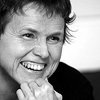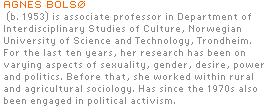| 
|  |  | 
|  |  | 
|  |  | There seems to be a consensus among Norwegian gays and lesbians that we have to reorient gay politics once judicial issues cease to top the list of challenges. Queer is one, but not the only perspective that would enable a political critique and constructive reorientation. The ideas that “queer theory” comprises are part of a larger critical move within the humanities and social sciences since the 1980s and before. However, queer stands out as the alternative in the Norwegian debate because of the way the political debate took queer critique as a pivotal point of departure. Obviously, queer itself is by no means devoid of challenges.[1] Having said that, no Western gay and lesbian political movement could avoid the influence of queer as it washed over us nearly two decades ago. However, the top people in the Norwegian movement generally reject it. In this text I will use the sometimes heated debate about queer to shed light on their resistance as well as the ideas that this resistance is based on. |  | 
| 
|  |  | 
Queer demonstrated new possibilities for rethinking sexual politics, but perhaps more importantly, queer ideas also exposed and made explicit how gender and sexuality were understood in a particular cultural, social and national context. Queer was resisted, embraced and reworked in locally very specific ways, and it was certainly impossible not to relate to queer if you were interested in ideas about gender and sexuality. This is also the reason why queer remains an important influence. Like it or not, queer theory has, somehow, to be negotiated and incorporated into the local understanding of sexual politics.[2] |  | 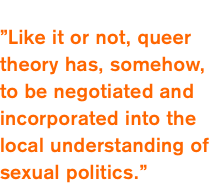
| 
|  |  | Politically, we sometimes find queer realised as a late modern form of anarchism. In Trondheim and Oslo, as well as in London, Madrid and Berlin, young people calling themselves queer may variously squat houses, oppose capitalism, corporate globalism, and any other hierarchy, or promote vegetarianism while rejecting the notion of gender altogether. Some would say that queer theory is compatible with anarchism in every way. I of course welcome this critical engagement with sexuality and gender, even if I have never gravitated towards anarchism myself, be it of modern or late modern forms. We have in Norway also the organisation “Queer Youth” (Skeiv Ungdom), challenging their mother organisation: The National Association for Gay and Lesbian Liberation (The Association, for short). I do not agree with everything that is in Queer Youth's platform, for instance that they want “gender taken out of the laws, [because] everyone should be equal before the law” (political platform agreed upon in 2006).[3] Furthermore, they oppose quotas for equal representation of women and men, since we cannot know what gender people may feel is applicable to them.[4] That position strikes me as too much of a celebration of both liberalism and deconstruction. Having said that, I am indeed very sympathetic to the alternative that Queer Youth is trying to develop in the shadow of the more prominent gay and lesbian political agents and their established ideas of gay politics. This article might explain some of the reasons for wanting to develop an alternative and also why it is difficult to be heard. There is an almost basic resistance to queer theory among those who do gay and lesbian politics on a national level. This has been as outspoken and evident in the gay press as in the left press and also at the national meetings of the gay and lesbian association. The equivalent to the term “gay and lesbian” in Norwegian is “homofile og lesbiske”, “homophiles and lesbians”. To maintain the term “homophile” has been essential for homo-positive politicians, gay and straight, for political reasons. Being “homo” is not mainly about sex, it is argued, but about philia, friendship and love. This has made queer theory's focus on the unruly nature of sexual desire problematic, too bound up with sex, with the flesh and its psychic compulsions. It is seen as particularly harmful in times in which the battles for church marriage, insemination and adoption rights have made it crucial for gays and lesbians to come across as fit parents. This partly explains the resistance to queer, but cannot account for all of it. |  | 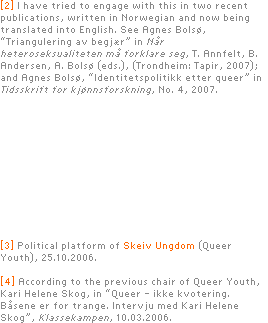
| 
|  |  | 
Compared to most other countries, it is easier in Norway to imagine that new ideas about gender and sexuality could become state policy. One might say that queer as state policy is a contradiction in terms, and I would not disagree with that. The nature of queer - if one can talk about the nature of a stream of thought, or pin down the nature of anything, for that matter - is always to be critical, always to resist, always to question. It therefore follows that it is quite simply not in the nature of queer to be carried out by public officials. On the other hand, that could be true for anything that seriously criticises present order, such as for instance socialist ideas. But a socialist party can in fact make a difference in a capitalist country, as again we see it for instance in Norway. In both cases - the socialist and the queer - the goal could be seen as walking towards the horizon, “... you'll never reach it, but it keeps you going”, as the filmmaker Rodrigo Vazquez has said about the promise of revolution.[5] |  | 
| 
|  |  | Nevertheless, as I have said, we have not in Norway seen much political implementation as a result of queer critique. Quite to the contrary, each and every established voice in gay politics on a national level rejects queer theory wholesale. I am still wondering why, having already mentioned that the queer focus on desire does not fit very well with today's political agenda, geared more towards family matters as it is. But queer's revelling in desire cannot be the whole explanation. There have been very heated debates, especially in front of national meetings of The Association. Many activists, especially among the young, want to discuss and see more of queer theory's ideas on identity, on power, on normativity tried out in practice. This leads to the question: do we have a gay establishment who sees its privileges undermined or threatened by the possible implementation of some of the basic ideas of queer theory? This is what I will argue here. The political agents, who will here be mentioned by their names, all hold quite ordinary, middle-class positions in Norwegian politics, bureaucracy and research (positions that are obviously similar to the one held by this author). My main focus will be ideas about gender and sexuality that these political agents seem to share. These are ideas that keep a quite specific form of gay politics going, with its particular effects on the public image of “the homophile”. I will emphasise that I am not talking about an elite in an economic or in any glamorous sense. Nor is the Norwegian elite a parallel to the American gay right elite which subscribes to economic liberalism and individual freedom and at the same time opposes collective action, solidarity and critique of capitalism.[6] On the contrary: in the present study the gay elite is on the political left. |  | 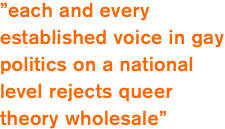
| 
| 
|  |  | 

|  |  |
|
